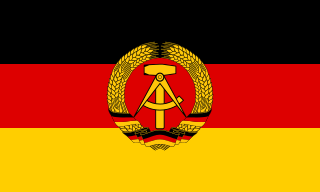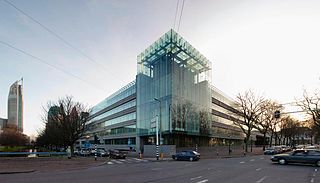
The Socialist Unity Party of Germany was the founding and ruling party of the German Democratic Republic from the country's foundation in 1949 until its dissolution after the Peaceful Revolution in 1989. It was a Marxist–Leninist communist party, established in 1946 as a merger of the East German branches of the Communist Party of Germany and Social Democratic Party of Germany.

The economy of the German Democratic Republic was a command economy following the model of the Soviet Union based on the principles of Marxism-Leninism. Sharing many characteristics with fellow COMECON member states — the East German economy stood in stark contrast to the market and mixed economies of Western Europe and West Germany. The state established production targets, set prices, and also allocated resources, codifying these decisions in comprehensive plans. The means of production were almost entirely state-owned. The GDR had an above-average standard of living compared to other Eastern Bloc countries or the Soviet Union, and enjoyed favorable duty and tariff terms with the West German market; in 1989, it was estimated that 50 to 60% of its trade was with Western countries. However by the mid-1980s its economy had reached a state of stagnation, contributing to the process of German reunification.

The Federal Ministry of Finance, abbreviated BMF, is the cabinet-level finance ministry of Germany, with its seat at the Detlev-Rohwedder-Haus in Berlin and a secondary office in Bonn.
The German Democratic Republic was created as a socialist republic on 7 October 1949 and began to institute a government based on the government of the Soviet Union during the Stalin era. The equivalent of the Communist Party in East Germany was the Sozialistische Einheitspartei Deutschlands, which along with other parties, was part of the National Front of Democratic Germany. It was created in 1946 through the merger of the Communist Party of Germany (KPD) and the Social Democratic Party of Germany (SPD) in the Soviet Occupation Zone of Germany. Following German reunification, the SED was renamed the Party of Democratic Socialism (PDS), which eventually merged with the West German Electoral Alternative for Labor and Social Justice to form the modern Left Party.
The Council of Ministers was the cabinet and executive branch of the German Democratic Republic from November 1950 until the country was reunified on 3 October 1990. Originally formed as a body of 18 members, by 1989 the council consisted of 44 members.

Harald Ringstorff was a German politician of the Social Democratic Party (SPD) and the Minister President of the state of Mecklenburg-Vorpommern. He headed a coalition government of the SPD and PDS from 1998 until 2006, and subsequently headed a coalition between the SPD and CDU. With a term of almost ten years, he is the longest-serving former incumbent to date. He served as President of the Bundesrat in 2006/07.

The Main Directorate for Reconnaissance was the foreign intelligence service of the Ministry of State Security (Stasi), the main security agency of the German Democratic Republic, from 1955 to 1990.

The German Democratic Republic (GDR), German: Deutsche Demokratische Republik (DDR), often known in English as East Germany, existed from 1949 to 1990. It covered the area of the present-day German states of Mecklenburg-Vorpommern, Brandenburg, Berlin, Sachsen, Sachsen-Anhalt, and Thüringen. This area was occupied by the Soviet Union at the end of World War II excluding the former eastern lands annexed by Poland and the Soviet Union, with the remaining German territory to the west occupied by the British, American, and French armies. Following the economic and political unification of the three western occupation zones under a single administration and the establishment of the Federal Republic of Germany in May 1949, the German Democratic Republic was founded on 7 October 1949 as a sovereign nation.

The Ministry of Finance is the Dutch Ministry responsible for economic policy, monetary policy, fiscal policy, tax policy, incomes policy, financial regulation, the government budget and the financial market. The Ministry was created in 1798 as the Department of Finance of the Batavian Republic. It became the Ministry of Finance in 1876. The Minister of Finance is the head of the Ministry and a member of the Cabinet of the Netherlands. The current Minister is Eelco Heinen.

The Ministry of Finance is a ministry within the Government of India concerned with the economy of India, serving as the Treasury of India. In particular, it concerns itself with taxation, financial legislation, financial institutions, capital markets, currency regulation, banking service, centre and state finances, and the Union Budget.

The National Defense Council of the German Democratic Republic was created in 1960 as the supreme state body of the German Democratic Republic in charge of national defense matters, including mobilization planning. The NVR held the supreme command of the GDR's armed forces, and the NVR's chairman was considered the GDR's commander-in-chief.

Bernhard Quandt was a German politician and party functionary of the Socialist Unity Party (SED).

The Ministry of Finance, Planning and Economic Development (MoFPED) is a cabinet-level government ministry of Uganda. Its mandate is to formulate sound economic and fiscal policies, mobilize resources for the implementation of government programmes, disburse public resources as appropriated by Parliament, and account for their use in accordance with national laws and international best practices. The cabinet minister of finance is Matia Kasaija. MoFPED was created by the 1995 Constitution of Uganda and derives its power from the Constitution and related acts of parliament, including the 2001 Budget Act and the 2003 Public Finance and Accountability Act. The current Director of Economic Affairs in the Ministry of Finance, Planning and Economic Development of Uganda is Lawrence Kiiza.

The Ministry of Finance is one of the fourteen ministries of the Government of Moldova. It is the central specialized body of public administration, which develops and promotes the unique policy of training and managing public finances, applying financial levers in line with the requirements of the market economy. In its activity, the Ministry of Finance is governed by the Constitution of the Republic of Moldova, the laws of the Republic, the decrees of the President of the Republic of Moldova, the resolutions of the Parliament, the ordinances, the decisions and the provisions of the Cabinet of Moldova.

The Ministry of Economy and Finance, also known by the acronym MEF, is a ministry of the Italian government. Its responsibilities include overseeing economic policy, public investments and spending. The Ministry's headquarters are located in Rome's historic Palazzo delle Finanze. The current minister in the Meloni Cabinet is Giancarlo Giorgetti.

Günther Jahn was a German politician and functionary of the Free German Youth (FDJ) and the Socialist Unity Party (SED).

Wolfgang Junker was a German construction manager, civil servant and politician of the Socialist Unity Party (SED).

Walter Halbritter was a German civil servant, politician and party functionary of the Socialist Unity Party (SED).
Heinz Vietze is a former German politician and party functionary of the Socialist Unity Party (SED) and its successors, the Party of Democratic Socialism (PDS) and The Left.
Karl Grünheid was a German civil servant and politician of the Socialist Unity Party (SED).















